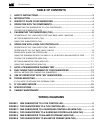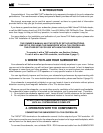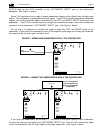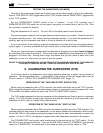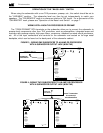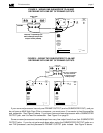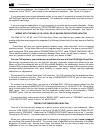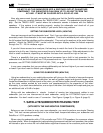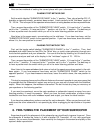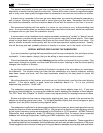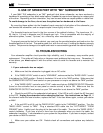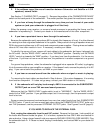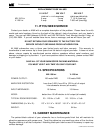
page 12
THX subwoofers
Here are two methods of setting the correct phase with your subwoofer.
PHASING TEST METHOD ONE
Set the switch labelled "SUBWOOFER PHASE" to the "+" position. Then, play a familiar CD, LP,
laserdisc or tape with steady, consistent bass content. Listen carefully to the "mid-bass" region of
70 - 125 Hz. This is the part of the spectrum where electric or string basses and drums predominate.
Then, reverse the position of the "SUBWOOFER PHASE" switch. If it is set to the "+" position,
set it to the "-" position. If it was set to the "-" position, set it to the "+" position. The best way is
to have a partner work the switch while you sit in the main listening position and listen.
Now listen to the same music, concentrating on the mid-bass. If you hear less bass, set the
"SUBWOOFER PHASE" switch to the opposite position. If you hear more bass, leave the switch
where it is; the new position is correct.
PHASING TEST METHOD TWO
First, set the toggle switch labelled "SUBWOOFER PHASE" to the "+" position. Then, feed
wideband pink noise (found on test CDs, the "Wow" disc, or a pink noise generator) through your
front channel speakers and your subwoofer. You can do this test by listening, but it is best to use
a spectrum analyzer and look at its display in the "mid-bass" region of 70 - 125 Hz.
Then, reverse the position of the "SUBWOOFER PHASE" switch. If it is set to the "+" position,
set it to the "-" position. If it was set to the "-" position, set it to the "+" position. The best way is
to have a partner work the switch while you sit in the main listening position and listen.
Now, listen to the same wideband pink noise or look at the spectrum analyzer output in the mid-
bass region. If you hear/measure less bass, set the "SUBWOOFER PHASE" switch to the
opposite position. If you hear/measure more bass, leave the switch alone; the new position is
correct.
This test is necessary because the different distances from each speaker to your ears mean that
it is possible that the Subwoofer's output may arrive at your ears out of phase with the Satellites'
output. When this happens, the midbass is cancelled. Re-do this test any time you move any of
your speakers or the listening position.
If you want to experiment, move the main speakers or subwoofer towards or away from your
listening position, in small increments. When you hear the best combination of stereo image
localization and focus with solid midbass impact and output, you have the ideal location.
If you have two subwoofers, perform one test for each subwoofer. When you perform each test,
make sure the other subwoofer is not operating by either unplugging its input cable or its power
cord.
8. FINE-TUNING THE PLACEMENT OF YOUR SUBWOOFER
Experimenting with the placement of the subwoofer can significantly improve its sound. Once
the subwoofer is hooked up, listen to it with a familiar CD, Laserdisc, LP, etc. with good bass
content. As you move the subwoofer, listen carefully for changes in the amount and quality of the
system's bass reproduction.



